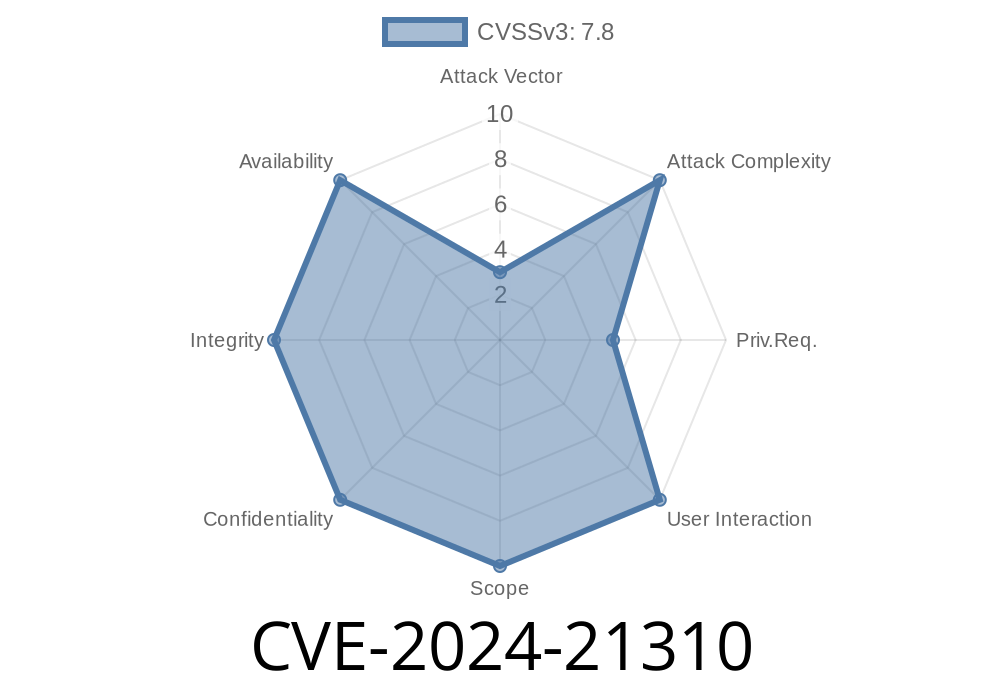In February 2024, Microsoft patched a serious vulnerability known as CVE-2024-21310, which affects Windows’ "Cloud Files Mini Filter Driver" (CfFltMgr.sys). The flaw allowed attackers to "elevate privileges"—meaning a hacker with basic access could gain full control over a Windows system by exploiting how Windows manages cloud-synced files.
Let's break down what CVE-2024-21310 is, how it works, and how it could be exploited, complete with simple code snippets to illustrate the danger.
What is CfFltMgr.sys and Why Does It Matter?
Cloud Files Mini Filter Driver, brought in with Windows 10 for OneDrive integration, is responsible for handling cloud-stored files—think those "Available Online Only" files that show a blue cloud icon. The driver helps Windows applications interact with those files as if they were local, handling their fetching and management in the background.
If a vulnerability appears in this driver, anyone who can run code on your system can potentially trick it into doing things with higher privileges—the beloved goal of attackers.
The Vulnerability: Elevation of Privilege
CVE-2024-21310 is an *Elevation of Privilege* (EoP) vulnerability. Here’s what that means in plain terms: If someone with limited system access can exploit this, they can jump up to SYSTEM-level rights—the highest on Windows.
According to Microsoft's advisory:
> “An attacker who successfully exploited this vulnerability could gain SYSTEM privileges... To exploit this vulnerability, an attacker would first need to log on to the system.”
This means the bug doesn’t grant remote access all by itself, but it’s a classic “second step” for attackers who have already gotten inside.
Exploit Details: How Could Attackers Abuse This?
Microsoft has not released full technical details, but reverse engineers have analyzed updates to CfFltMgr.sys and suggest the vulnerability could be exploited by manipulating file metadata or triggering the driver to mishandle certain calls in its code.
They craft a special request or file that confuses CfFltMgr.sys.
3. The driver performs a privileged operation on the attacker’s behalf, like creating a file owned by SYSTEM or running code with full rights.
Code Snippet: Playing With Cloud Files IOCTL
Let's say an attacker wants to interface with the driver using an IOCTL (input/output control) call, which is how programs talk to Windows drivers. In the past, vulnerabilities like this have involved sending carefully crafted requests to these drivers.
Example C code that demonstrates how an attacker *might* try to open a handle to the driver
#include <windows.h>
#include <stdio.h>
int main() {
HANDLE hDriver = CreateFileW(
L"\\\\.\\CldFlt", // the Cloud Files Mini Filter symbolic link
GENERIC_READ | GENERIC_WRITE,
, NULL, OPEN_EXISTING, , NULL);
if (hDriver == INVALID_HANDLE_VALUE) {
printf("Failed to get handle to driver. Error: %lu\n", GetLastError());
return 1;
}
// Suppose the bug relates to IOCTL handling; parameters must be found by reverse-engineering...
DWORD bytesReturned;
char inBuffer[512] = {};
char outBuffer[512] = {};
// This IOCTL code is hypothetical as Microsoft did not publish details
DWORD ioctlCode = x90022800;
BOOL result = DeviceIoControl(
hDriver,
ioctlCode,
inBuffer, sizeof(inBuffer),
outBuffer, sizeof(outBuffer),
&bytesReturned,
NULL
);
if (!result) {
printf("DeviceIoControl failed with error: %lu\n", GetLastError());
} else {
printf("IOCTL sent successfully!\n");
// Attacker now checks for privilege escalation, etc.
}
CloseHandle(hDriver);
return ;
}
Disclaimer: The above code is for educational demonstration. The real exploit would require knowledge of the exact buggy code path Microsoft patched.
Who is at Risk?
- Any Windows system with cloud file support enabled. That means all modern versions of Windows 10 and 11 especially with OneDrive, SharePoint, Dropbox, or other cloud-sync clients using Windows APIs.
Enterprise environments where users regularly switch from low to high privilege contexts.
- Attackers who already have “user” access on a target machine can leverage this to become full SYSTEM admins.
Mitigation and Protection
Patching is Essential! Microsoft fixed CVE-2024-21310 in February 2024 Patch Tuesday. Update your Windows systems to stay safe.
- If you cannot patch immediately, consider disabling cloud sync services or using AppLocker to restrict execution of unknown code.
References
- Microsoft Official Advisory: CVE-2024-21310
- Cloud Files Mini Filter Driver Documentation
- SecurityWeek: Microsoft’s February 2024 Patch Tuesday
Final Thoughts
CVE-2024-21310 is another reminder that even “background” Windows components like file sync drivers can be used as stepping stones by attackers. Keep your systems patched, monitor for unusual file system activity, and treat even “boring” drivers as critical infrastructure!
If you want to test or learn more, set up an isolated test VM, enable cloud sync, and use tools like WinDbg and Procmon to see how CfFltMgr.sys behaves.
Timeline
Published on: 01/09/2024 18:15:54 UTC
Last modified on: 04/11/2024 20:15:17 UTC
